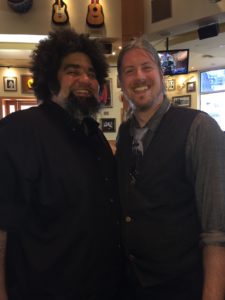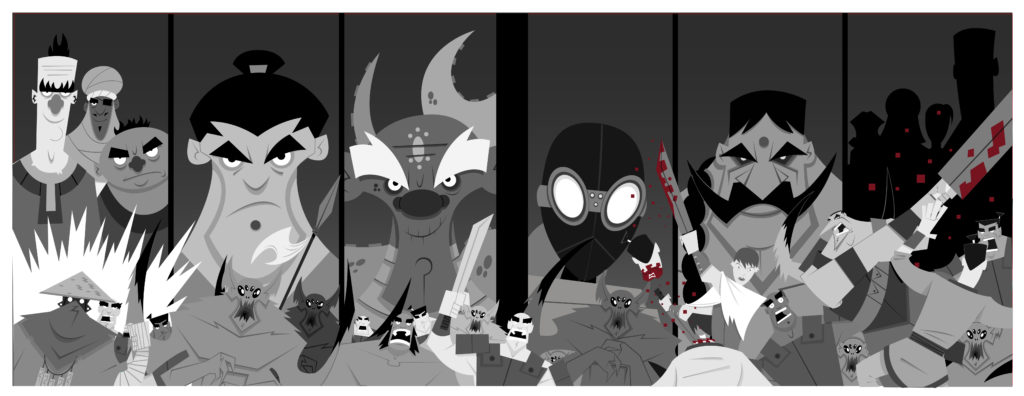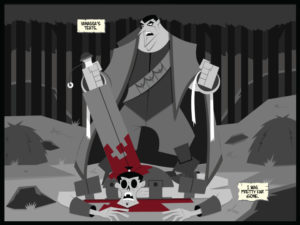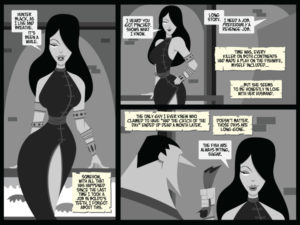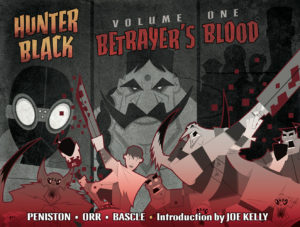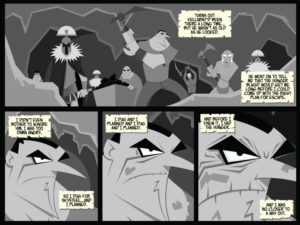A week ago, we here at Tellest were given the awesome opportunity to promote the first comic series from the Otherworld. Hunter Black is an awesome hardboiled fantasy web comic that’s recently been given new life as a beautiful paperback collection of its first volume. I had a chance to sit down and speak with creators Justin Peniston and William Orr, who let me see what went into their process for making such an interesting character and entertaining series. They also talk about their heroes and what’s next for them. Read on to find out more about Hunter Black and his very talented creators.
Tellest: Hi there Justin and William. I’m very happy to be able to speak to you today. You’ve done a lot of things that fans of fantasy and comics will no doubt love to hear about. You also have tons going on between your multitude of projects, so I appreciate you giving us the time to pull back the curtain
Justin Peniston: Hi, thanks for talking to us.
William Orr: Hey man!
T: We’ll get into what I’ll call your flagship work, Hunter Black, but I want to set the stage a little bit as well. Justin, you’ve done some work with some very prominent nerd-culture platforms, like Marvel, DC and Cartoon Network. Does your mind explode at the idea of doing what so many people would dream to do?
JP: Well, my 21-year old self would certainly be mind-blown by what I’ve done so far…but the truth is, all I’ve really done is gotten my toe in the door. For the longest time, I thought that what I needed was to catch the eye and attention of THE POWERS THAT BE, and I kind of accomplished that. There are publishers and editors and producers that know who I am, no doubt. Turns out that all that gets you, maybe, is an opportunity. The real work is in entertaining people, in taking them out of their lives and giving them somewhere else to exist for a while. The real work is letting people access their feelings in, and I hate to use this term for this subject, a safe space.
But yeah, my job is pretty cool.
T: And William, you’re no slouch either. You’ve had the opportunity to work with DC’s Zuda Comics web comic imprint, and you’re the artist behind the stylistic works in Hunter Black—which now has nearly 1,300 comic pages at the Hunter Black website. Do your hands ever get tired?
WO: Ha! Sometimes they do. When Justin and I first decided to do Hunter Black as a webcomic, we understood that, to keep a fan base going, we had to deliver content on the days we advertised said content. I try and be a month ahead of our readers so if anything happens, like not being able to draw for 2 weeks because of my wedding, we still have pages to upload. I can honestly say we have never missed a posting day. I also just really like drawing; I have always done it for as long as I can remember, it’s kind of hard to get tired doing something you love.
T: During the current climate, with everything going on with the coronavirus and shelter-in-place orders and things of that nature, has it been easier to focus on something like Hunter Black and your other creative outlets, or are you finding some challenges there?
JP: Well…my day job, which was really a night job, vanished as a result of COVID-19. So, yeah, I’ve had more time. I haven’t always had more energy. These are trying times, and sometimes they weigh on my soul. It’s not always easy to be creative in those times…and it’s even harder (for me, anyway) to focus on some of the day to day admin work that takes up a lot of my time. Writing the Newsletter is hard. Doing regular updates for our Patrons is hard.
All of that said, it’s gotten easier as time has gone on. You can get used to anything, I guess.
WO: Yeah, my day job went on hold for about 3 months, so I was able to get a lot of work done. On top of Hunter Black I had the time to branch out into other projects. I hate to admit during these trying times how nice it was not being able to leave your home. I had lots of drawing time.
T: So, you both met working in the restaurant industry. When did you realize you had a shared love of so many common interests? Between comics, cartoons, D&D and anything else, that must have felt a bit like finding a kindred spirit.
JP: Some of our co-workers sort of tried to arrange a playdate between us before we ever really connected, because they knew about our shared interest in working in comics and cartoons. But when we finally started talking, there was initially no interest in collaborating. We had different notions about what we wanted to do. BUT we had a lot of shared interests, and similarly twisted senses of humor, and so we just became friends and eventually roommates.
WO: Like Justin said, we had a lunch meeting to feel each other out and hit it off. The sad thing about this business is you sometimes meet people that aren’t as dedicated to getting stuff done as you might be, taking time to feel someone out is very important to ensure your time doesn’t get wasted. Luckily, Justin wasn’t one of those people and I’m very fortunate to be working with him.
T: How long have you both known one another? Are there any interesting stories you can tell us since you’ve became friends and roommates?
JP: Oh, good lord. Will transferred into my restaurant in 2007, I think. We were friendly within a month or two after his arrival, I’d say…and roommates about a year or so later. (We’re both married now. It really bothers our wives that we’ve chosen to continue to live together.)
Seriously though, we’ve been through a lot together. Meeting our wives, traveling for conventions to San Diego, Chicago, and New York, too many episodes of entirely too much alcohol. We don’t even call each other friends or collaborators. Our official title for each other is HeLPer, for Hetero Life Partner.
WO: Yeah, it’s been like 13 years!
T: You mentioned conventions, and from what I read, that was one of the big driving forces for turning Hunter Black into a comic collection, right? How has the reaction been when you’ve gone to conventions and shown that off? Did you even have the chance to really get it in front of people before the world shut down and we had to stop partaking in things like the convention circuit?
JP: We’ve had reasonable success at conventions. We’ve managed to break even in terms of our cost-to-sales, and we’ve picked up a few new readers by going to cons. Honestly, our biggest gains happen when we show up on a panel somewhere. There have been a few times when we’ve been noticed by a news outlet or new means of distribution, and that has been helpful.
Since the COVID-19 crackdown, we’ve had two cons cancelled or postponed out from under us. Not fun but what else can they, or anyone, do?
WO: Man, conventions are a wild place! You better have some thick skin ‘cause working a booth can be a soul crushing experience. It is real fun talking to a guy about the comic and he walks away mid-sentence to another booth!
Even if we don’t break even, I always consider conventions a success, attracting readership is especially important. If we can even get one more reader from a convention, then it’s worth it in my eyes.
T: As I mentioned above, you both have a fair share of experience and acclaim when it comes to comics. When it came to Hunter Black, how deep into your freelancing work were both of you before you realized that it was time to begin your own project?
JP: I had just really started to break out in comics. I’d done a few things for DC, but I was really banging my head up against the wall with getting creator-owned projects going in other spaces. Creator-owned, original properties were really what interested me, and I didn’t quite have enough of a name to COMMAND attention the way I would’ve liked.
WO: I was in a “project blackhole” when Justin first approached me with doing another series with him. We originally planned for Hunter Black to be an animated pitch and the more we got into it, and the more noir we got, we realized no network would pick it up. You must remember, we created Hunter Black before the age of Netflix or Amazon Prime. So, after a couple of other ideas we decided to do this as a webcomic.
T: Is there any interest still in seeing what could happen with Hunter Black in other mediums? I know there are people who followed your Kickstarter who couldn’t help but also want to see it exist somewhere in animated form.
JP: Well, we wouldn’t say no to a Hunter Black animated series. Like Will just said, we started off envisioning this as an animated pitch. I’ve worked quite a bit more in animation since then, too. Once we both have some time, I’d love to see us put together a pitch deck for an animated series.
We’ve also talked a lot about the possibilities of creating a role-playing game or a campaign setting based on the comic, but again, it’s just about finding the time. Doing that WELL would require a real investment of time and effort.
Strangely, I’ve never considered Hunter Black as an IP to use in anything live action. I mean, I’m literally talking about it now and I’m still not considering it. Some of the comic hinges on what Will has done with it visually. I don’t want to see Hunter’s nose translated into live action. But like we always say, add a zero to the check and you’d be surprised what I’m up for!
WO: We have considered animation, a Dungeons and Dragons setting, and if I remember correctly, we had a quick conversation about maybe a board game. A Hunter Black TV Show would be very cool and would also create a circle back to what we originally though this project could be.
T: What inspired Hunter Black? It’s obviously got a lot of influences: Chinatown, Middle-Earth, Samurai Jack (I also can’t help but want to play a Hunter Black game in a style akin to Guacamelee).
JP: The first real domino for Hunter Black was when Will and I both read The Hunter, Darwyn Cooke’s graphic novel adaptation of the novel of the same name by Richard Stark (the nom de plume of Donald Westlake). I’d actually been hearing about Stark’s Parker novels in a lot of places, specifically some of the ancillary material in the works of Ed Brubaker and Greg Rucka, and my curiosity had been piqued. So, when one of our favorite cartoonists came out with an adaptation, I had to read it. It’s not an exaggeration to say it was life changing. I read and reread that book a dozen times in a month. Finally, I turned to Will and said, “I want to do something like THIS.”
WO: Darwyn Cooke and the Parker adaptations were the main driving force for creating this webcomic. When we decided to take this noir concept and place it in a fantasy setting, my first thought was Michael Moorcock. I have always been a fan of darker fantasy; I will take the Elric Saga over Tolkien any day of the week. I am also heavily influenced by Genndy Tartokvsky; when I watched the first episode of Samurai Jack, it blew me away! It took me a couple of years after that day to start experimenting with art without line and I have not looked back. Movies like Casablanca also helped set a visual tone, the reason the book is predominantly black and white is a deliberate noir choice.
T: Who is the biggest “name” who you’ve been able to share Hunter Black with? Have any of the people who inspired the work seen the amazing job you’ve done yet?
JP: Hmm. Well, Joe Kelly is a member of Man of Action. Those guys created Ben 10 and Big Hero 6, and all four of them have worked extensively on the biggest characters at Marvel and DC (Superman, Spider-Man, X-Men, JLA). Joe wrote the introduction to the graphic novel and all of the others have copies of the book. (They keep inviting me to work on cartoons with them, so they must think it’s halfway decent.)
Greg Rucka was reading the comic for a while, and even gave us a nice review in the blog of his own webcomic. Matt Wagner is a huge influence on everything original that I do in comics, and I was able to give him a copy of the book.
Probably my biggest regret regarding Hunter Black is that we weren’t able to put it in front of Darwyn Cooke before he passed. It would mean a lot to me, and even more to Will, to get a copy to Genndy Tartakovsky.
WO: I have a friend who has a friend who worked with Genndy, from what I have heard a copy of Hunter Black was given to him, but who knows if that actually did happen.
Like Justin said, giving a copy to Darwyn Cooke would have been awesome!
T: When you started working on Hunter Black, how far ahead in the story had you thought about? We’re obviously talking about something that grew to over 1000 pages—we’re talking thousands of panels here. Also, how far do you plan on taking Hunter Black?
JP: Okay, so this is a story. We knew that we were going to do an origin story to begin with, that Hunter needed to take up his quest somewhere. We’d come up with an angle, that Hunter was an archer, but he needed to master swordsmanship because he needed his magic sword to keep himself alive.
I’m busy trying to figure out the story beats, and Will brings me his first finished drawing of Hunter himself. Now, we’d already decided that we were going to do the comic exclusively in grayscale, except we were going to use red for blood…we wanted to really sell the hard-boiled noir sensibility. So, Will shows me this design of a character wearing a red cloak.
“Dude, what’s with the red cape?”
“I don’t know, it looked cool. Want me to change it?”
“No. No…I can work with this.”
That broke the story for me, believe it or not. I was telling the story of why Hunter’s cloak was red.
I don’t think we could have predicted that we’d be 1300 pages in with so much story still left to tell. When it comes down to it, we’re just doing cool stuff that we like, and until recently, most of it was not wrapping up this story. Because this is a finite story. There is an end. I’m just now starting to see that end on the horizon…but we’ve still got a ways to go.
WO: When we first build a story arc Justin and I have brain storming sessions on where we want to take the story. After the initial conversation, Justin starts building on what we talked about. Sometimes he’ll ask me if there is anything cool I want to draw and if he thinks up of anything real crazy, he will ask me if I’m cool with his idea (like killing a major character, for example) We’ve worked together for so long I trust what he does and we rarely end up disagreeing with the stories direction.
For me, I want to keep going as long as the series is fun. We have an end story, don’t get me wrong, and if we need to finish it, we can wrap it up. But I don’t think that will be any time soon.
T: Even when things do wrap up, you’ve written so much content that there’s a whole world surrounding Hunter Black now. Are there any characters who could pick up the mantle and become a series protagonist if you want to allow Hunter to hang up his cape?
JP: Oh, that would be telling. I would be shocked if we followed up Hunter Black with anything that could be described as a sequel or spinoff. But you never know.
WO: Who knows! Mu! Ha! Ha! Ha! Ha!
T: Were there any challenges when you decided to start doing things on your own? Or had your history working freelance made things pretty easy to move over?
JP: On one hand, it was extremely easy. We did a little research, made a few decisions, paid someone to help us with a site, and we were on our way. Making the comic has never been hard for us. Getting people to find the site and read it? That’s been a much bigger challenge.
WO: When we first started the biggest challenge for me was making sure we had pages ready to honor our posting schedule. Creating the series and website itself was kind of easy! That is the nice thing about creating art for the internet, it is a low startup cost.
T: How cool was it getting the first volume published in book format? You had already accomplished a lot with the webcomic but having something tangible in hand had to be an awesome feeling.
JP: I don’t think I’ve ever had a prouder moment than when I saw that book. I should probably take this opportunity to give a shout out to Jacob Bascle, who does all of our nuts and bolts design work. He designed our logo, he letters the comic, and he laid out the book for print. The book is very professional looking in my humble opinion, and that’s 100% due to Jacob. I’m pretty used to the book at this point, but I’m still shocked by how good it looks when I thumb through it.
WO: I love it! The two things that blew me away was seeing the final cover image produced and making the EAN barcode on the back, we had to buy that! We decided that the cover was going to be a wraparound image and I had to factor spine length into the dimensions of the piece. Once we locked down the final page count, I grabbed as many books as I could find with the same page length and measured each spine to make sure I did not screw this thing up. The image looked cool, but it did not scream done until Jacob worked his design magic. He did a phenomenal job making the piece look amazing!
T: How did you guys end up meeting and working with Jacob?
JP: Jacob and I were basically repped by the same management for our comics work. Well, Jacob was doing more basic production and design at the time, and he wanted to get into doing more comics lettering. Will and I hired him with that in mind, not really knowing exactly how much Jacob could do.
Jacob is an indispensable partner to us. He’s our first fan, the first person to see where we’re going and occasionally give us feedback. He contributes stuff in cool and interesting ways, sometimes in ways we don’t anticipate. He’s a smart, creative, and reliable dude. He’ll work with me on any project I can get him on.
WO: I had zero part to play in getting Jacob to work with us. All I can really say on this subject matter is Jacob is the f*cking man.
T: How did you feel about the experience getting some of the word out on Kickstarter? You had some pretty interesting rewards there for people to have characters killed or survive their encounter with Hunter Black. What was it like interacting with your backers?
JP: Kickstarter is HARD. It’s much harder than we expected it to be. We went into our first Kickstarter somewhat naively. We managed to honor all of our commitments, but it took a while. We learned a lot and we’ll do the next one a little differently.
Letting people put characters into the comic was an interesting challenge. One of our backers let her kids design the character for us to include…and he had purple eyes. Like, we don’t use purple in our comic. At all. I was kind of reluctant at first. Fortunately, Will’s not as tight-assed as I am, and his ability to make it work made it much easier.
That said, I don’t know if we’ll do that again. We’ll see.
WO: Dude, Kickstarters are stressful! Like Justin said, we went into the campaign with little to no idea how it works. After we succeeded and got the money, we discovered that Jacob had to build the book, and it was going to take like a month because of his other projects. Then we had problems with colors and had to spend time tweaking those. Once the book was good to go, we ran into the Chinese New Year, then we had delays in the Port of Los Angeles. Then we discovered that UPS refused to deliver the palette of boxes to Justin’s apartment so on Christmas Eve we had to rent a U-Haul and drive to the port to pick the stuff up. Then I had to mail everything, which was another nightmare.
The one silver lining in all of this is we are going to be set up for success before we even launch another campaign. We have already discussed that we want like 99% of the work done before we hit the submit button, which should make a good deal of the headaches go away.
As for the rewards, it was kind of cool. I feel that with comics you must be a little creative on what you can give your backers. Putting fan characters into your comic is a creative way to not only fill those backer levels but also to get your readership more invested in your product.
T: You worked with PrintNinja to manufacture the book. How was the process of developing that using their site, getting back proofs—all that jazz?
JP: Oh, this is much more a Will and Jacob question. Using the site itself was pretty easy, I recall that. Seeing the proofs was…an amazing experience. I can definitely say that we were happy enough with our experience with PrintNinja that we’ve recommended them to other independent creators.
WO: Print Ninja was amazing to work with. They were extremely professional, and I highly recommend using them if you consider doing some book printing.
T: With the first book completed and ready for purchase from you at your website and at conventions (when those resume), are there plans to continue along with more volumes?
JP: We’re in the earliest stages of planning for a collection of Hunter Black Volume Two right now, and I’m hoping we won’t take too long to get to Volume Three thereafter. One book can be seen as a fluke. Two books is a SERIES.
WO: Yeah, collecting book 02 is in the works, and if we are setting that up, we might as well start working on book 03 as well.
T: Are there any other projects you guys are collaborating on? Anything we should know from your solo tracks as well?
JP: Will and I are collaborating with some other folks in the animation scene on some original pitches and projects. It’s a lot of development work at the moment, which means a fair amount of writing for me. If something catches the eye of someone with money, then Will comes in to do more design work.
I’m also working on a pilot and an anthology of short prose fiction.
WO: Besides Hunter Black, I’ve been focusing on a animated pitch with Justin and some other guys, I’m in the beginning stages of creating a miniature game but, I’m not sure how far I want to take it (building 3D models of miniatures is a lot of work!), and finally I’ve started taking commissions drawing peoples Dungeons & Dragons characters, which was been a blast!
T: Alright, last question. What advice would you give to storytellers, artists and creators who want to do the kind of things you’re doing? Where do you start, and what do you aim for?
JP: First of all, don’t do this kind of thing for money. I mean, it would be nice to make money, yes…but there is no more competitive career than storytelling, almost regardless of your chosen medium. So, if you don’t absolutely LOVE what you’re doing, if you can’t keep on doing it in the face of a lack of success, then you are setting yourself up for heartbreak.
Once you know you have the love, don’t take NO for an answer. Marvel, DC, and Image don’t determine the value of your work. Netflix and Hulu don’t determine the value of your work. The internet provides endless possibilities for making your work available to the public, and many of them are cheap or free. Do it yourself.
Keep your word. Hit your deadlines. Care about your product. Care about your audience. The work will show it if you don’t.
WO: Some of the best advice I got was from a podcast that Skottie Young was on. For the folks that do not know, Skottie Young is an artist and writer that predominantly works for Marvel Comics as well as some creator owned stuff with Image Comics. During the podcast, while talking about creating art commercially, he said that sometimes you just need to get it done. You might see all the problems with your work but likely no one else will; just get it done.
Make sure when you say you are going to post that you post. The quickest way to lose readership is to not post.
T: Thank you both very much for taking the time to talk to me during this interview. I feel like even though a lot of the world is shut down, we still must be discerning with our creative free time, so I appreciate it very much.
Now’s your chance to tell readers and promising new fans where they can find you and your work. Let’s see those links!
JP: The best way to get to the things that Will and Jacob and I do is to go to our Linktree. That will give you links to Hunter Black on the web, to our online merch store, Raygun Tea Party, to all of our personal websites, and to our newsletter sign-up.
If you’re interested in our book, you can buy it through both the webcomic site and my personal website, or you can become a Patron. Becoming a Patron is the BEST way to support your favorite hard-boiled fantasy webcomic and is the most surefire way to help us get more books into print.
Thanks so much for talking to us today!
WO: On top of everything Justin just said you can also check out my stuff on my website.
Thank you so much and I had a blast talking with you.
Thank you very much to Justin and William for joining me for this interview. This was a lot of fun, and we had a lot to talk about, seeing as it was the first comic experience we’re hearing from firsthand. The first volume of Hunter Black is available now, and it’s chock full of goodness. I’ve got my copy. You should consider checking it out, too!
I’m looking forward to seeing what the creators do, so you can bet we’ll be keeping an eye on them!
Michael DeAngelo
Latest posts by Michael DeAngelo (see all)
- Fantasy Promo – Quinine - July 25, 2024
- Sigil Art – Grim’s Hold - July 24, 2024
- Fantasy Promo – Light the Shadows (Under Elfhame’s Stars) - July 24, 2024

